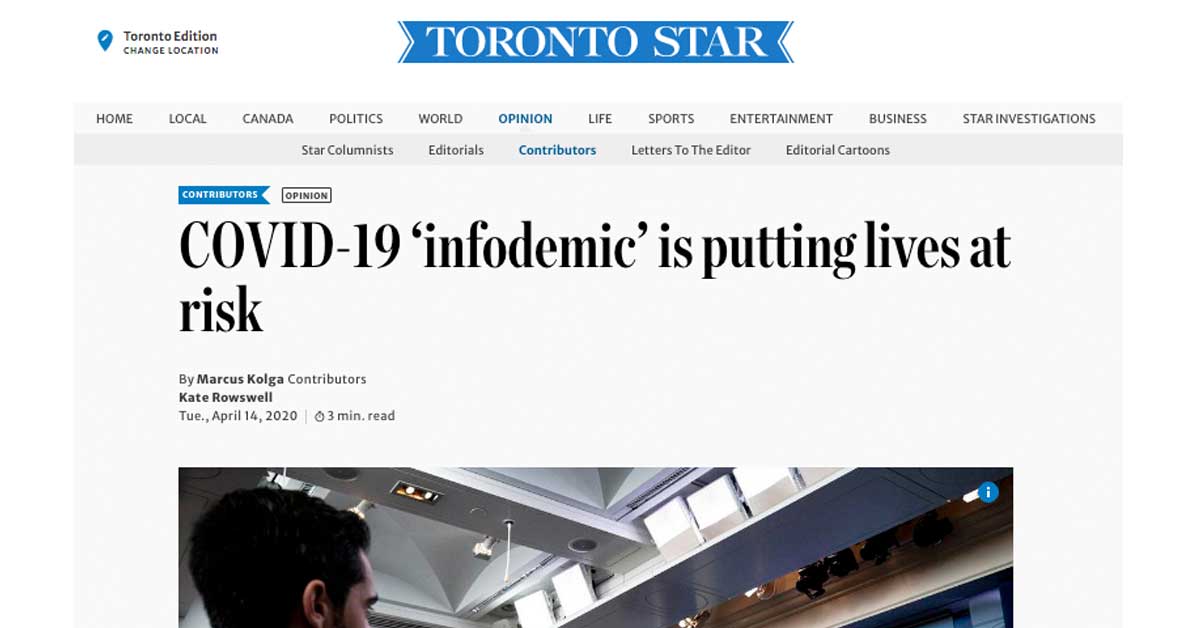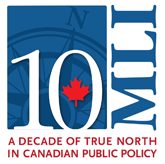By Marcus Kolga and Kate Rowswell, April 15, 2020
As fear and uncertainty about COVID-19 sweep the world, a rise in misinformation about the virus and its origins, as well as, unfounded claims about miracle cures, are putting Canadians at great risk.
The Canadian government — and specifically the minister of health — must join other Western nations in addressing the threat of COVID-related misinformation. One excellent way to achieve this is by publicly debunking falsehoods and correcting the record as information threats emerge.
We shouldn’t underestimate this challenge: the escalating “infodemic” contains a slew of toxic narratives from foreign regimes. Propaganda and disinformation in this case is designed to intensify the destabilizing impact of the virus, and to exploit soft-power opportunities — such as the masked effort to buy influence via “donations” of personal protective equipment. The manipulation of statistics to hide the extent of infection under totalitarian regimes is also a threat. Collectively, these actions grossly undermine global efforts to assess and address the pandemic.
As self-isolation increases, so too does our reliance on social media. There, we find a cacophony of narratives about causes, cures and protective measures. One recent meme claimed that heat and moisture of the kind found in a sauna can kill the virus, and that doctors in Wuhan are injecting people with vitamin C to prevent infection.
This kind of viral malinformation taps into our growing anxieties about COVID-19, threatening to drown out science and reason. Unproven treatments constantly emerge, many planted by foreign actors or snake-oil salesmen, and are then shared with the best of intentions by friends, family and colleagues. Regardless of intent, misinformation hurts us all, and we need to be more aware about the consequences of passing it around.
Thankfully, a growing number of organizations and individuals are fighting disinformation on social media platforms. But one newer arena that is still almost impossible to monitor is in group messaging apps. A recent example was an audio recording ostensibly from the University Hospital of Gran Canaria in the Canary Islands. The soothing female voice claims that a Dr. Negrin at the hospital has advised warding off the virus by eating soup, drinking hot liquids, and gargling warm water mixed with vinegar.
We contacted the hospital to verify the source, and a representative from the Canary Islands Health Department responded: “There are a lot of workers in the hospital and we don’t know exactly who has recorded this audio. However, we can tell that the “advice” in this audio is fake and extremely dangerous.” The claims made in the clip have been debunked from a medical perspective, but not before the clip reached millions of Facebook users via its Messenger app, circumventing the platform’s content filters and user reporting features.
Some world leaders have not helped. President Trump amplified untested claims that the anti-malaria drug Chloroquine could cure COVID-19. Yet in a French trial of the drug, six patients dropped out, three of them were treated in intensive care, and one died. Many more were harmed following the President’s “advice” and self-medicating with the drug at home.
In the U.S. and Europe, thousands of people have shared dangerous misinformation about a poisonous liquid known as the “Miracle Mineral Solution.” The use of this mixture of water and bleach to cure COVID-19 has prompted the US Food and Drug Administration to warn: “If you’re drinking ‘Miracle’, or ‘Master Mineral Solution,’ or other sodium chlorite products, stop now!”
Where most Canadians should recognize the dangers of ingesting toxic chemicals, claims about the healing properties of vitamin C, or of gargling with warm water, are perhaps less obvious. The confusion sown by these less blatantly false claims may ultimately prove more deadly, as citizens who believe in the treatments fail to isolate or respect social distancing, and spread the disease to countless others.
While the Canadian government has taken significant steps to inform Canadians about protecting themselves against COVID-19, it is clearly failing to effectively educate us about the infodemic. The infodemic and the pandemic go hand-in-hand, and should both be taken extremely seriously, since each of them poses a significant threat to public health in Canada.
Kate Rowswell is a Affiliate Researcher at the Max Bell School of Public Policy at McGill University. Marcus Kolga is a Senior Fellow at the Macdonald-Laurier Institute’s Center for Advancing Canada’s Interests Abroad.
More here:
COVID-19 ‘infodemic’ is putting lives at risk: Marcus Kolga and Kate Rowswell in The Star
https://www.thestar.com/opinion/contributors/2020/04/14/covid-19-infodemic-is-putting-lives-at-risk.html


